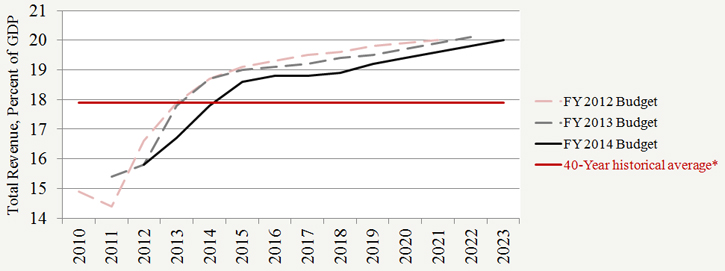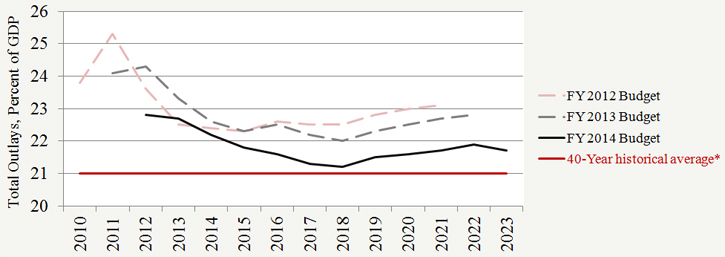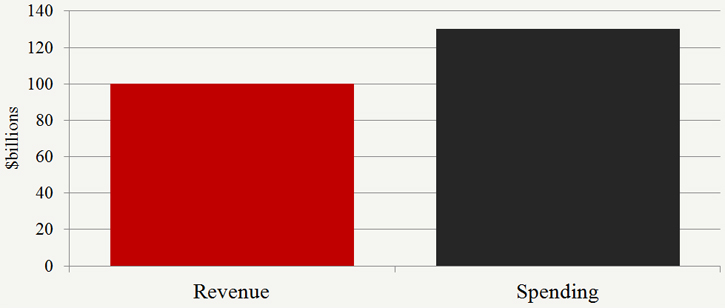Obama Budget Preview: Tax, Spend, & More Gimmicks
Next Tuesday, President Obama is expected to release his fiscal year 2015 budget. It will be 29 days late, but Americans should not expect to see any evidence of leadership. The President’s budget is not expected to make any tough decisions or be in touch with reality any more than it has been in the past. The President’s previous budgets have taken the untenable position that he can increase spending, increase taxes, and increase the debt without any meaningful reforms.
Obama Budgets Overtax
Every one of President Obama’s budgets has assumed tax revenue levels rarely seen in the U.S. The last three budgets have all assumed revenue will reach 20 percent of GDP. The U.S. has only reached this level once since World War II: in fiscal year 2000.
Obama Budgets Overtax

*This is the historical average revenue using GDP figures available to the Administration when these budgets were released. In July 2013, BEA issued a comprehensive GDP revision for 1929-present. The new 40-year average is 17.4 percent.
Last year’s budget raised taxes by $1.1 trillion over 10 years, including more than $150 billion from taxing international businesses. Press reports indicate that international business tax hikes will be included in the budget again next week. Last year’s budget also included more than $500 billion in tax hikes from capping deductions without a corresponding lowering of tax rates. Next week’s budget may also recycle the 2014 budget’s approach of containing a goal of revenue-neutral corporate tax reform without detailing how to get there.
Obama Budgets Overspend
The 2015 budget reportedly will include $56 billion in new spending for a laundry list of programs. If his past budgets are any indication, he will not offset the cost of these programs by cutting spending elsewhere in his budget. The President has never proposed -- for even a single year -- a spending level equal to our 40-year average.
Obama Budgets Overspend

* This is the historical average spending using GDP figures available to the Administration when these budgets were released. In July 2013, BEA issued a comprehensive GDP revision for 1929-present. The new 40-year average is 20.4 percent.
In his budget, the President reportedly will “call for an end to the era of austerity that has dogged much of his presidency.” It is unclear how the President defines austerity. Since 1947 the four largest deficits as a percentage of the economy have been in fiscal years 2009, 2010, 2011 and 2012.
The President’s spending requests have gotten less extravagant in recent years only because of common-sense discretionary spending restraints enacted by the Republican-controlled House of Representatives. President Obama claims that he wants to do something about America’s long-term debt outlook. Sometimes he even mentions entitlements, the true drivers of our long-term debt. However, news reports have said that the 2015 budget will not include any meaningful entitlement reforms and will abandon any pretense of spending restraint. In fact, the most notable reform from last year’s budget has reportedly been abandoned.
Chained CPI Removed; White House Surrenders to Far Left
The White House is already surrendering to the far left, which was upset about a technical adjustment to the inflation measurement included in last year’s budget. The Administration announced last week that it will not again include its proposal to move to a limited version of chained CPI in this year’s budget.
“The White House blamed House Republicans for refusing to entertain raising tax revenue in exchange for including chained CPI — but added that Obama’s offer to include chained CPI in exchange for raising new tax revenue remains on the table, as part of the negotiating process.” – Politico, 2/20/2014
The Administration neglects to mention that its watered-down version of chained CPI would increase revenue by nearly as much as it would cut spending. The White House also does not mention that without reforms, programs that would be affected by chained CPI will be cut drastically. For example, Social Security’s trustees report that without changes, Social Security recipients will see a permanent 23 percent benefit cut beginning in 2033. Chained CPI will not solve our entitlement problems, but it is a helpful, though small, step toward reform. The President’s budget takes a pass on that opportunity.
Chained CPI is already a balanced deal
10-Year Savings in Obama's FY 2014 Budget Proposal

Six Years of Wasted Opportunities
“[T]he vast majority of Democrats on Capitol Hill would prefer not to have to do anything on entitlements … [but] it’s not an option for us to just sit by and do nothing.” – President Obama, July 11, 2011
President Obama is about to propose his sixth budget, but he has failed to propose meaningful reform in all of them. The President’s failure will hurt young people most of all. Under his policy of avoiding tough decisions on our nation’s entitlement programs, they are the ones most heavily burdened with a huge national debt, ever-rising annual deficits, and a weaker economy.
Next Article Previous Article
